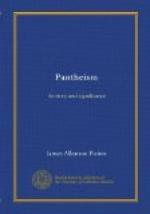FOREWORD.
[Sidenote: Pantheism not Sectarian or even Racial.]
Pantheism differs from the systems of belief constituting the main religions of the world in being comparatively free from any limits of period, climate, or race. For while what we roughly call the Egyptian Religion, the Vedic Religion, the Greek Religion, Buddhism, and others of similar fame have been necessarily local and temporary, Pantheism has been, for the most part, a dimly discerned background, an esoteric significance of many or all religions, rather than a “denomination” by itself. The best illustration of this characteristic of Pantheism is the catholicity of its great prophet Spinoza. For he felt so little antagonism to any Christian sect, that he never urged any member of a church to leave it, but rather encouraged his humbler friends, who sought his advice, to make full use of such spiritual privileges as they appreciated most. He could not, indeed, content himself with the fragmentary forms of any sectarian creed. But in the few writings which he made some effort to adapt to the popular understanding, he seems to think it possible that the faith of Pantheism might some day leaven all religions alike. I shall endeavour briefly to sketch the story of that faith, and to suggest its significance for the future. But first we must know what it means.
[Sidenote: Meaning of Pantheism.]
[Sidenote: God is All.]
[Sidenote: But not Everything Is God.]
[Sidenote: Analogy of the Human Organism.]
Pantheism, then, being a term derived from two Greek words signifying “all” and “God,” suggests to a certain extent its own meaning. Thus, if Atheism be taken to mean a denial of the being of God, Pantheism is its extreme opposite; because Pantheism declares that there is nothing but God. This, however, needs explanation. For no Pantheist has ever held that everything is God, any more than a teacher of physiology, in enforcing on his students the unity of the human organism, would insist that every toe and finger is the man. But such a teacher, at least in these days, would almost certainly warn his pupils against the notion that the man can be really divided into limbs, or organs, or faculties, or even into soul and body. Indeed, he might without affectation adopt the language of a much controverted creed, so far as to pronounce that “the reasonable soul and flesh is one man”—“one altogether.” In this view, the man is the unity of all organs and faculties. But it does not in the least follow that any of these organs or faculties, or even a selection of them, is the man.
[Sidenote: The Analogy Imperfect but Useful.]




